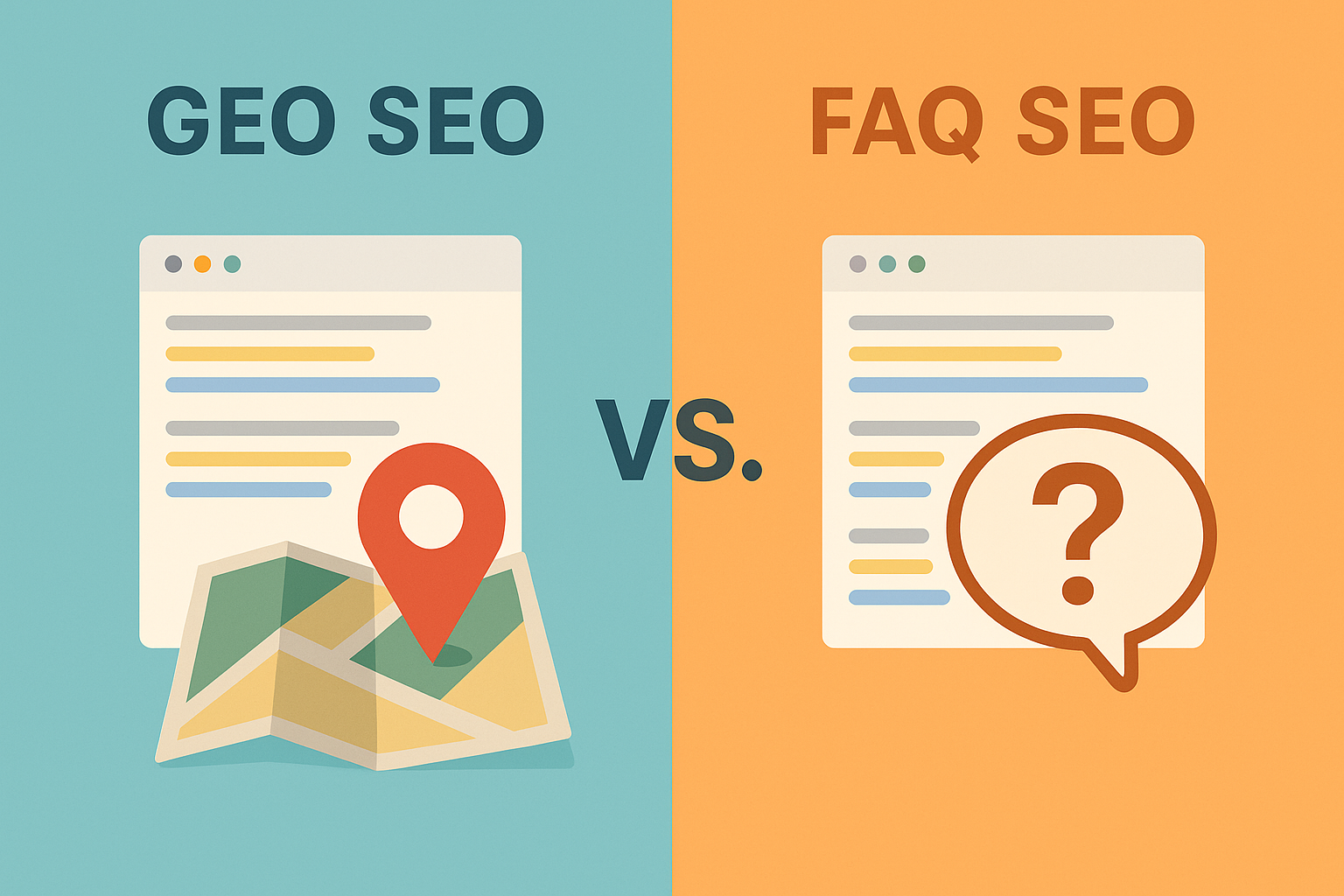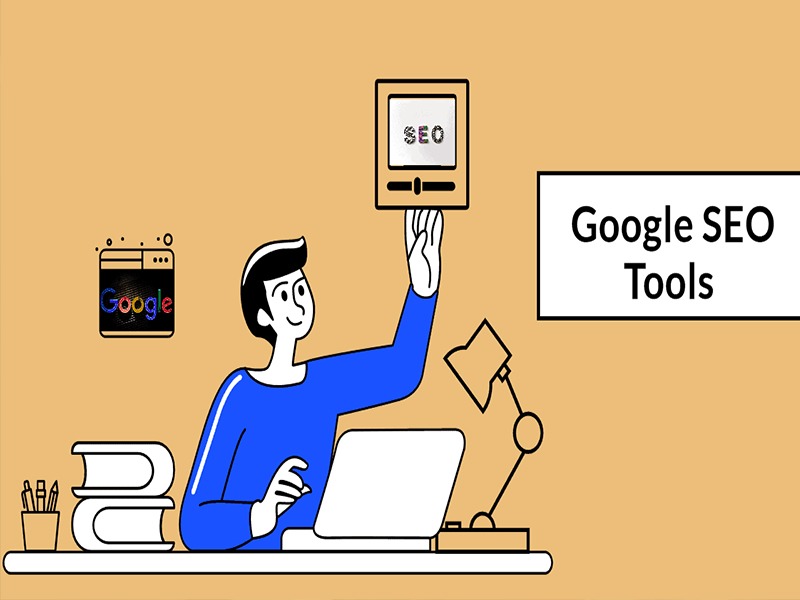With the changing dynamics of digital marketing, search engine optimization (SEO) has the effect of being a pillar of exposure and traffic. Nevertheless, among the wide range of SEO techniques, two powerful methods are gaining an opportunity to become a crucial step to taking over search engine outputs: Geo SEO and FAQ SEO. Although both focus on enhancing rankings and increasing traffic, they use different tactics. Geo SEO focuses on marking locations, whereas FAQ SEO responds to questions. It is essential for businesses that want to grow online, particularly local businesses, to know how both methods differ, their benefits, and their use cases.
What is Geo SEO (Targeting Locations)?
Geo SEO or Local SEO optimizes a business’s online presence for specific geographical locations. From being a plumber in Phoenix to being a coffee shop in Manhattan, the point is to make sure that people find you based on searching for local services.
Why Geo SEO Matters
Search engines, notably Google, pay close attention to localized content when users search for location-based queries such as pizza near me or the best dentist in Chicago. Geo SEO ensures that your business appears in the search results when potential consumers in your service areas search.
Core Tactics of Geo SEO
Google Business Profile Optimization:
- Claim and optimize your Google Business Profile (formerly Google My Business). This is essential to showing up in the “Local Pack”, as far as the map on top and three business listings that appear for local search queries are concerned.
Local Citations:
- Guarantee NAP (Name, Address, Phone Number) uniformity on such business directories as Yelp, Bing Places, and Yellow Pages.
Local Keywords:
- Include location-specific keywords throughout your site, such as “emergency plumber Miami,” “HVAC repair in Dallas,” etc.
Location Pages:
- Develop single pages addressing specific cities, neighbourhoods, or service areas where you operate.
Mobile Optimization:
- With many local searches on the mobile platform, a fast, mobile-friendly site is necessary.
What is FAQ SEO (Answering Questions)?
FAQ SEO focuses on targeting user query-based searches in search engines. This involves making your answers short and using FAQ schema markup to improve how your content is displayed in search results.
Why FAQ SEO Matters
User intent is the new thing in modern SEO. Google now prefers content that directly addresses users’ questions. As a result of the increase in voice search and intelligent assistants, many people inquire in natural-language queries such as “How do I unclog a drain?” or “What is the best time to post on Instagram?”
Through FAQ schema SEO, businesses can appear in the rich results so that users can directly answer their questions without having to click on their site (or “position zero”).
Core Tactics of FAQ SEO
Identify Common Questions:
- Use tools like Answer the Public, Google’s “People Also Ask,” and competitor research to find relevant questions your target audience is asking.
Create an FAQ Section:
- Build a robust FAQ section on each significant service page and your homepage. Focus on clarity and relevance.
Use FAQ Schema Markup:
- Apply structured data (JSON-LD format) so that Google can read and show your questions and answers in search results.
Natural Language Optimization:
- Write answers conversationally. This aligns better with voice search and natural language processing.
How to Combine Both for Maximum SEO Power
Why choose one when you can do both? Many businesses are now integrating Geo SEO and FAQ SEO into a hybrid strategy that satisfies local and informational intent.
Step 1: Build a Local Keyword Strategy
Start by identifying local keywords relevant to your business. Include geo-modifiers like city names, zip codes, and neighborhood identifiers. For example:
- “Roof repair in Atlanta”
- “Affordable gyms in Brooklyn”
Use tools like Google Keyword Planner, Ubersuggest, and SEMrush to find terms with search volume and low competition.
Step 2: Create Localized Landing Pages
Each landing page should concentrate on a precise location. Add testimonials from clients in that area, location-specific photos, and embed Google Maps. Include your target local keywords naturally in:
- Page titles
- Meta descriptions
- Header tags
- URL slugs
- Image ALT text
Step 3: Add Localized FAQs to Each Page
Now, integrate the FAQ SEO directly onto your local pages. Use questions that combine both approaches, such as:
- “What’s the best pizza place in Chicago?”
- “Do you offer emergency plumbing in Tampa?”
Add FAQ schema markup so that your answers can appear in search results.
Step 4: Use Blog Content for Authority Building
Supplement your local landing pages with blog articles that answer broader questions:
- “5 Signs You Need Roof Repair”
- “How to Save on Energy Bills with New HVAC Units”
Include internal links back to your local pages and answer-location hybrid queries like:
- “Where can I find affordable AC repair in Las Vegas?”
Benefits of Geo SEO and FAQ SEO for Local Businesses
Combining these two strategies brings a host of benefits:
Increased Visibility:
- Geo SEO helps you dominate local searches, while FAQ SEO gives you visibility in informational queries, including voice search and featured snippets.
Higher Click-Through Rates:
- Rich snippets from the FAQ schema stand out in search results, increasing your click-through rate.
Better User Experience:
- Visitors get quick, relevant answers to their questions, which reduces bounce rates and builds trust.
Enhanced Local Authority:
- Answering local questions (like “Do you offer weekend service in Charlotte?”) positions your brand as the go-to in your area.
Local Business SEO Tips for Implementing Both Strategies
Don’t Neglect Mobile:
- Both Geo and FAQ SEO heavily rely on mobile users. A fast, responsive site is non-negotiable.
Use Google Search Console:
- Monitor which search terms bring users to your FAQ or local pages. Based on performance data, optimize further.
Add FAQs to Product and Service Pages:
- Don’t relegate FAQs to a single page. Spread them out strategically across your site.
Optimize for Voice Search:
- Use natural, conversational language. Most voice queries are question-based and location-specific.
Keep Schema Markup Updated:
- As your FAQs change, ensure your structured data is accurate and validated using Google’s Rich Results Test.
Get Reviews:
- Encourage customer reviews on Google and Yelp. These help both your local rankings and provide new user-generated content.
Stay Consistent:
- Whether you’re optimizing for cities or answering customer questions, keep branding and messaging consistent across the board.
FAQs About Geo SEO and FAQ SEO
1. What is the difference between Geo SEO and Local SEO services?
Geo SEO is another name for Local SEO services. Both focus on optimizing your online presence for precise locations, helping you index higher in local searches. The term “Geo SEO” is often used to emphasize the geographic targeting element of the strategy.
2. How does the FAQ schema SEO help my rankings?
The FAQ schema adds structured data to your web pages, allowing Google to display your questions and answers directly in the search results. This improves your chances of being featured in rich snippets and increases visibility and click-through rates.
3. Can I use Geo SEO and FAQ SEO together?
Absolutely. Combining both strategies is highly recommended. Use Geo SEO to capture location-based searches and FAQ SEO to answer common questions related to your services. Together, they maximize your website’s visibility and authority.
4. What is a good local keyword strategy?
A strong local keyword strategy involves:
- Targeting city, neighborhood, and zip code keywords
- Including service + location phrases (e.g., “roof repair Austin”)
- Researching competitors’ keywords
- Using tools to find low-competition, high-intent queries
5. How many FAQs should I include on a page?
There’s no strict number, but aim for 4–8 well-written FAQs per service or location page. Too few may not provide value; too many can overwhelm the user.
6. Do FAQ schema and Geo SEO work for service-area businesses?
Yes. Even if you don’t have a physical storefront, Geo SEO helps target the cities or counties you serve. Use location-based pages and FAQs like “Do you serve X area?” to clarify your reach.
7. Are the FAQ schema and local SEO only for Google?
While Google benefits the most from structured data, other search engines like Bing and Yahoo also interpret schema markup. Local SEO works across all major platforms, including maps and voice assistants.
8. Can I use AI tools to help with FAQ and local content?
Yes. AI tools (like ChatGPT) can help brainstorm location-specific content, write natural-sounding FAQs, and suggest keyword variations for your local keyword strategy, saving you time while enhancing SEO quality.
Final Thoughts
Geo SEO and FAQ SEO are not alternative methods but adjuncts in your SEO armoury. When you target locations, you ensure that your business is found by those locally searching. Asking questions establishes reliability and power with your audience and search engines. Whether you work with professional SEO services or in-house, these techniques can be vital for your success in a competitive online world.









